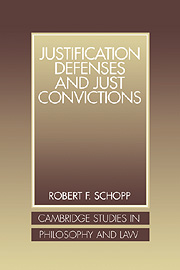Book contents
- Frontmatter
- Contents
- Preface
- Frequently Cited Sources
- Dedication
- 1 Justification Defenses: The Issues
- 2 Justification Defenses and the Conventional Public Morality
- 3 Self-defense
- 4 Self-defense and Battered Women
- 5 Duress and Systemically Complete Mitigation
- 6 The Limits of Justification: Necessity and Nullification
- 7 Conclusions
- Index
7 - Conclusions
Published online by Cambridge University Press: 29 October 2009
- Frontmatter
- Contents
- Preface
- Frequently Cited Sources
- Dedication
- 1 Justification Defenses: The Issues
- 2 Justification Defenses and the Conventional Public Morality
- 3 Self-defense
- 4 Self-defense and Battered Women
- 5 Duress and Systemically Complete Mitigation
- 6 The Limits of Justification: Necessity and Nullification
- 7 Conclusions
- Index
Summary
The criminal law embodies an important component of the official representation of the conventional public morality. As such, it provides a set of behavioral directives and incentives designed to maintain a system of cooperative social interaction, but it also serves important expressive functions. Criminal offense definitions and justification defenses instantiate the more abstract substantive principles of the conventional public morality in a form that facilitates interpretation and application by officials and citizens. These provisions also contribute to the definitions of the parameters of the public and nonpublic jurisdictions. Certain offense elements, excuses, and mitigating factors represent systemic criteria of accountability and blameworthiness.
Justification defenses preclude conviction and punishment of individuals who violate offense definitions in circumstances that preclude the condemnation inherent in conviction and punishment because they support exceptions to the underlying prohibitory norms of the fully articulated conventional public morality. In order to understand the significance and parameters of the general category of justification defenses and of each particular justification defense, one must interpret them in light of the condemnation expressed by conviction and punishment in a system of criminal law that embodies substantive principles of political morality.
Legal conviction and punishment ordinarily expresses condemnation of five types at two levels of analysis, but only the first type of condemnation, expressed at the institutional level by the proscription of certain act-types as criminal offenses, inheres in every institution of legal punishment.
- Type
- Chapter
- Information
- Justification Defenses and Just Convictions , pp. 199 - 204Publisher: Cambridge University PressPrint publication year: 1998



